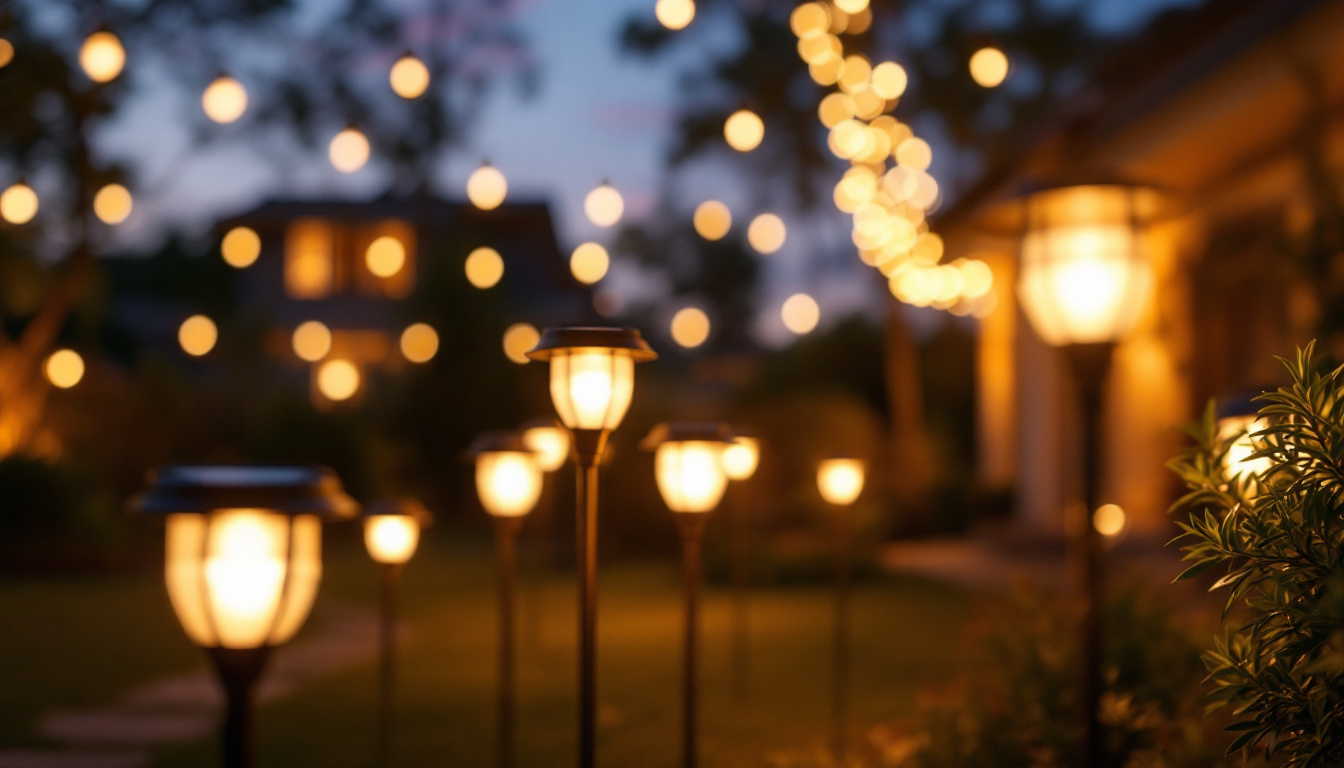
outdoor lights Solar Powered: How to Future-Proof Lighting Projects
In the ever-evolving world of lighting design and installation, outdoor solar-powered lights have emerged as a vital component for contractors aiming to enhance their projects while being environmentally conscious. As the demand for sustainable solutions grows, understanding how to effectively implement solar-powered lighting can significantly benefit contractors, clients, and the planet alike. This article delves into how to future-proof lighting projects by integrating solar technology, addressing key considerations, and exploring innovative solutions.
Solar-powered lighting systems harness energy from the sun, converting it into electricity to power outdoor lights. This technology consists of solar panels, batteries, LED lights, and controllers that work together to create a self-sustaining lighting solution. As energy costs continue to rise and environmental concerns become more pressing, solar-powered lights offer a practical and sustainable alternative to traditional electric lighting.
One of the most significant advantages of solar-powered lighting is its low operating cost. Once installed, these systems require minimal maintenance and no ongoing electricity expenses, making them an attractive option for both residential and commercial applications. Additionally, solar lights are often easier to install than traditional wired systems, reducing labor costs and installation time.
Moreover, solar-powered lights contribute to sustainability efforts by reducing reliance on fossil fuels and minimizing carbon footprints. As more clients seek eco-friendly solutions, offering solar-powered options can enhance a contractor’s reputation and attract environmentally conscious customers. The versatility of solar lighting also allows for creative applications, such as illuminating pathways, gardens, and even parking lots, making them an ideal choice for enhancing safety and aesthetics in various settings.
Understanding the components of solar lighting systems is crucial for contractors looking to implement these solutions effectively. The primary elements include:
In addition to these core components, many solar lighting systems now incorporate smart technology, allowing for features such as motion sensors and remote control operation. This advancement not only enhances energy efficiency but also improves security by ensuring lights activate only when needed. Furthermore, some systems are designed to be aesthetically pleasing, with decorative fixtures that blend seamlessly into landscaping, providing both functionality and visual appeal. As technology continues to evolve, the integration of solar lighting with smart home systems is becoming increasingly popular, offering users the convenience of controlling their outdoor lighting from their smartphones or other devices.
When planning a solar-powered lighting project, several factors must be taken into account to ensure optimal performance and longevity. These considerations can significantly impact the effectiveness and satisfaction of the final installation.
A thorough site assessment is essential before installing solar lighting. Factors such as the geographic location, shading from trees or buildings, and the orientation of the solar panels can influence the system’s efficiency. Conducting a detailed analysis will help determine the best placement for solar lights, ensuring they receive adequate sunlight throughout the day.
Additionally, understanding the specific lighting needs of the area—whether for security, ambiance, or wayfinding—will guide the selection of appropriate fixtures and configurations. For instance, areas that require heightened security may benefit from brighter lights with motion sensors, while pathways might only need softer illumination to create a welcoming atmosphere. Furthermore, seasonal changes and local climate conditions should also be considered, as they can affect the solar panel’s performance and the overall energy output throughout the year.
Not all solar-powered lights are created equal. Contractors should prioritize high-quality products that are durable and designed for outdoor use. Look for lights with robust materials, weather resistance, and long battery life. Furthermore, consider the lumen output and color temperature of the LEDs to match the desired aesthetic and functionality of the space.
Investing in reputable brands and products can lead to fewer maintenance issues and higher customer satisfaction, ultimately enhancing a contractor’s credibility in the market. It’s also wise to explore innovative features such as smart technology integration, which allows for remote control and scheduling of lighting, or solar lights equipped with sensors that adjust brightness based on ambient light levels. These advancements not only improve energy efficiency but also provide added convenience and versatility for users.
Understanding local regulations and codes regarding solar lighting installations is crucial for contractors. Compliance with these regulations not only ensures the safety and legality of the installation but can also affect the project’s overall success. Familiarize yourself with zoning laws, electrical codes, and any specific requirements for solar installations in your area.
By adhering to regulations, contractors can avoid potential fines and rework, thereby streamlining the installation process and enhancing client trust. Additionally, staying informed about any incentives or rebates available for solar installations can provide financial benefits, making the project more appealing to clients. Engaging with local authorities early in the planning phase can also facilitate smoother approvals and foster positive relationships that may benefit future projects.
The solar lighting industry is continually evolving, with new technologies and solutions emerging to improve efficiency and functionality. Staying informed about these innovations can provide contractors with a competitive edge and enhance their project offerings.
Smart solar lighting systems integrate advanced technologies such as motion sensors, timers, and remote control capabilities. These features allow for greater control over lighting schedules and energy consumption, making them ideal for areas with varying lighting needs throughout the day.
Additionally, smart systems can be connected to mobile apps, enabling users to monitor performance and adjust settings remotely. This level of customization can significantly enhance user experience and satisfaction. Furthermore, many smart solar lights now incorporate artificial intelligence, which can learn user habits and optimize lighting accordingly. For instance, they can automatically brighten when motion is detected or dim during periods of inactivity, maximizing energy efficiency while ensuring safety and visibility.
Hybrid solar lighting systems combine solar technology with traditional electrical sources, providing a reliable solution for areas with inconsistent sunlight. These systems can automatically switch between solar and grid power, ensuring continuous operation regardless of weather conditions.
By offering hybrid solutions, contractors can cater to a broader range of clients and project requirements, ultimately increasing their marketability and potential revenue. These systems are particularly beneficial in regions where solar energy alone may not suffice due to seasonal changes or geographical limitations. Moreover, they can serve as a backup during power outages, ensuring that essential areas such as parking lots or emergency exits remain illuminated, thereby enhancing safety and security.
Modern solar lighting solutions come in various designs and styles, allowing contractors to select fixtures that seamlessly blend with the surrounding environment. From decorative pathway lights to robust security floodlights, the design flexibility of solar lights can enhance the aesthetic appeal of outdoor spaces.
Incorporating unique designs can also help contractors differentiate themselves in a competitive market, attracting clients looking for customized solutions. The ability to choose from a range of materials—such as stainless steel, aluminum, or eco-friendly composites—further allows for personalization that can meet specific client preferences or environmental considerations. Additionally, some manufacturers now offer customizable colors and finishes, enabling contractors to match the lighting fixtures with the branding or architectural style of a project, thus creating a cohesive and visually appealing outdoor environment.
As technology continues to advance, future-proofing solar lighting projects is essential for contractors aiming to stay relevant and competitive. By considering emerging trends and adapting to changing client needs, contractors can ensure their projects remain viable and effective in the long term.
Energy efficiency is a growing concern for consumers and businesses alike. By prioritizing energy-efficient products and practices, contractors can align their offerings with market demands. This includes selecting high-efficiency solar panels and LED lights, which can significantly reduce energy consumption and enhance overall performance.
Moreover, educating clients about the benefits of energy efficiency can foster trust and encourage them to invest in sustainable solutions.
Keeping abreast of the latest technological advancements in solar lighting is crucial for contractors. Regularly attending industry conferences, participating in training sessions, and subscribing to relevant publications can provide valuable insights into emerging trends and best practices.
By staying informed, contractors can make educated decisions about product selections and project implementations, ensuring they remain at the forefront of the industry.
Strong client relationships are essential for long-term success in the lighting industry. By providing exceptional service, transparent communication, and ongoing support, contractors can foster loyalty and encourage repeat business. Offering maintenance services or follow-up consultations can also enhance client satisfaction and demonstrate a commitment to quality.
Furthermore, soliciting feedback from clients can provide valuable insights into their needs and preferences, allowing contractors to refine their offerings and better serve their target market.
Incorporating solar-powered lighting into outdoor projects presents a unique opportunity for contractors to enhance their offerings while contributing to sustainability efforts. By understanding the technology, considering key project factors, and embracing innovative solutions, contractors can future-proof their lighting projects and meet the evolving demands of clients.
As the industry continues to shift towards greener solutions, those who adapt and innovate will not only thrive but also play a pivotal role in shaping a more sustainable future for outdoor lighting.
Ready to elevate your lighting projects with the most sustainable and innovative solutions? At LumenWholesale, we provide contractors like you with the highest quality, spec-grade solar-powered lighting products at unbeatable wholesale prices. Say goodbye to local distributor markups and hello to superior products that meet the highest industry standards. With our hassle-free bulk buying and free shipping, you can secure premium lighting at the best value — ensuring your projects are not only future-proof but also cost-effective. Don’t compromise on quality or affordability. Discover wholesale lighting at the best value today and light up your projects with confidence and convenience.

Discover how lighting contractors can master the Body Shop Stand with expert tips, boosting efficiency and safety.

Discover essential strategies for lighting contractors to enhance project outcomes and client satisfaction.

Discover the science behind UVC sanitizer lights and their transformative impact on the lighting industry.

Discover the secrets to boosting profitability in outdoor lighting installations with our comprehensive guide on lantern light solutions.